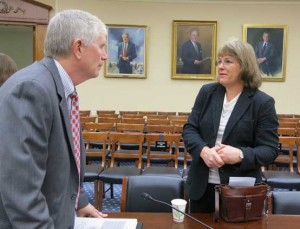WASHINGTON — Science, technology, engineering and math education in the United States should be improved not by changing the way it is taught, but by changing the way its teachers are educated, a panel of science professionals recommended to Congress on Thursday.
Industry professionals who transition to teaching later in their careers can enhance the delivery of STEM education because they have real-world experiences to share and draw from, the scientists said.

Rep. Mo Brooks, R-Ala., and Huntsville City Schools teacher Christine Sutton. Photo by Sara J. Martinez/MNS
“They’re uniquely situated to help kids understand not only the science, technology, engineering and math education aspect of it, but why it’s important and how it connects to real lives,” agreed Rep. Mo Brooks, R-Ala., chairman of the House subcommittee on research and science education.
Grissom High School teacher Christine Sutton told the subcommittee she had an engineering career before she went back to school for a master’s degree in secondary math education. Now she teaches a class on cybersecurity as part of the Huntsville City School System’s Academy of Applied Math and Science, along with algebra, computer science and advanced placement computer science.
“I was amazed by how many students and adults disliked math,” Sutton said about what inspired her career switch, “and believed that I could transfer my love of problem solving to the classroom and to change attitudes and build confidence.”
She said her more than 20 years of industry experience combined with her education training makes her performance more effective; STEM training and teacher education are not mutually exclusive.
“When you make the move to leave industry to become a secondary educator or any kind of educator, you’re teaching students,” she said. “You may have great expertise, but you need to have the preparation and the heart to really be involved with the students.
While education degree programs have student teaching requirements to ensure experience in the classroom, new teachers still aren’t getting enough practical, hands-on experience in the field they teach, said Robin Willner, vice president of global community initiatives at IBM.
“We don’t prepare world champion sports teams by discussing the physics of the jump shot or the history of the Olympics,” Willner said. “We give them time to practice, and that’s what our teachers need.”
If experts aren’t prepared to take on teaching jobs — where they would likely suffer large pay cuts — they can share their experience and help students by serving as mentors or coaches in community STEM programs.
Career day isn’t enough for students to get exposure to or excited about certain careers, according to Jason Morella, president of the Robotics Education and Competition Foundation.
“It’s taking that next huge step to actually working with the students, mentoring them in a STEM challenge and solving problems with them that makes the impact and has a long-term influence,” he said in written testimony. “Students are able to watch these professionals, talk to them, ask them questions and most importantly see that the fields they are in are interesting, stimulating and actually possible to pursue.”
